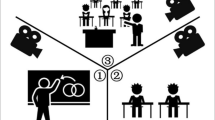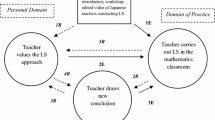Abstract
Micro-teaching at universities and student teaching in secondary schools are standard forms of practice training for pre-service mathematics teachers in Chinese university teacher education programs. The former is guided by university professors, and the latter is guided by school teachers. In recent years, a special kind of micro-teaching practice held at university and guided by expert secondary mathematics teachers was organized to link the regular micro-teaching and student teaching. The purpose of this study is to investigate one aspect of the impact of micro-teaching guided by expert secondary mathematics teachers on pre-service teachers’ teaching practice: learning to attend to precision. Four normal university students majoring in mathematics were selected and observed when they were teaching: before, during, and after the activity. Each lesson was videotaped, transcribed, and then analyzed using qualitative data analysis methods. The reflections from the participants were also collected and analyzed. The results indicate that micro-teaching guided by expert secondary mathematics teachers can help pre-service teachers attend to precision in their classroom teaching, but some lack of precision in performance was still observed in the pre-service teachers’ lessons. The guidance and the exemplary lessons of expert teachers played an important role in changing the pre-service teachers’ performance. The findings have the potential to be useful for mathematics teacher preparation and professional development programs. It could possibly also contribute to other research areas in mathematics classroom teaching.
Similar content being viewed by others
Notes
The concept of function of degree one rather than linear function is taught in middle school in Chinese mathematics curriculum. The function of degree one is a linear function, but not a constant function.
References
Aleksandrov, A. D. (1956). Mathematics, its essence, methods and role. Moscow: USSR Academy of Sciences.
Azzouni, J. (2009). Why do informal proofs conform to formal norms? Foundations of Science, 14, 9–26.
Ball, D. L., & Forzani, F. M. (2010). Teaching skillful teaching. Educational Leadership, 68(4), 40–45.
Berliner, D. C. (1988). The development of expertise in pedagogy. Retrieved from http://files.eric.ed.gov/fulltext/ED298122.pdf.
Berliner, D. C. (2001). Learning about and learning from expert teachers. International Journal of Educational Research, 35(5), 463–482. doi:10.1016/S0883-0355(02)00004-6.
Cheng, J., & An, S. (2015). How the expert mathematics teachers open a lesson in Chinese high school: A case study in Shanghai. In Paper presented at the 27th Annual Ethnographic and Qualitative Research Conference, Las Vegas.
Cheng, J., & Bao, J. (2013). Which aspects of prospective mathematics teachers’ teaching knowledge and skill need to be improved: From the perspective of experienced high school teachers. Proceeding of EARCOME6 3, 117–126.
Edwards, B. S., Dubinsky, E., & McDonald, M. A. (2005). Advanced mathematical thinking. Mathematical Thinking & Learning: An International Journal, 7(1), 15–25.
Gilbert, M. C. (2014). Using productive disposition to differentiate between students’ level of precision when critiquing a peer’s work. School Science and Mathematics, 114(7), 339–348.
Hill, H. C., Blunk, M. L., Charalambous, C. Y., Lewis, J. M., Phelps, G. C., Sleep, L., Ball, D. L. (2008). Mathematical knowledge for teaching and the mathematical quality of instruction: An exploratory study. Cognition and Instruction, 26(4), 430–511.
Kaiser, G., & Li, Y. (2011). Reflections and future prospects. In Y. Li & G. Kaiser (Eds.), Expertise in mathematics instruction: An international perspective (pp. 343–353). New York: Springer.
Li, Y., Huang, R., & Yang, Y. (2011). Characterizing expert teaching in school mathematics in China: A prototype of expertise in teaching mathematics. In Y. Li & G. Kaiser (Eds.), Expertise in mathematics instruction: An international perspective (pp. 167–195). New York: Springer.
Maher, C., & Weber, K. (2009). Precision in the teaching, learning, and communication of elementary school mathematics: A reply to Wilson’s “elementary school mathematics priorities”. Retrieved Nov. 7, 2016, from http://www.math.jhu.edu/~wsw/papers2/education/14a-elem-math-priorities-rebuttal-09.pdf.
National Governors Association Center for Best Practices, & Council of Chief State School Officers (2010). Common Core State Standards for Mathematics. Washington, DC: Author.
Otten, S., Engledowl, C., & Spain, V. (2014). Teachers’ developing talk about the mathematical practice of attending to precision. In S. Oesterle, C. Nicol, P. Liljedahl & D. Allan (Eds.), Proceedings of the 38th conference of the International Group for the Psychology of Mathematics Education and the 36th conference of the North American Chapter (Vol. 6, p. 191). Vancouver: PME.
Otten, S., Engledowl, C., & Spain, V. (2015). Univocal and dialogic discourse in secondary mathematics classrooms: The case of attending to precision. Zentralblatt für Didaktik der Mathematik, 47(7), 1285–1298.
Pan, X. (2013). Differences between expert and new math teachers’ classroom teaching and its enlightenments. Education and Teaching Research, 27(5), 19–23.
Plano Clark, V. L., & Creswell, J. W. (2010). Understanding research. New Jersey: Pearson Education.
Santagata, R., & Yeh, C. (2014). Learning to teach mathematics and to analyze teaching effectiveness: Evidence from a video- and practice-based approach. Journal of Mathematics Teacher Education, 17(6), 491–514.
Schleppenbach, M., Flevares, L. M., Sims, L. M., & Perry, M. (2007). Teachers’ responses to student mistakes in Chinese and U.S. mathematics classrooms. The Elementary School Journal, 108(2), 131–147.
Simpson, A. (2015). The Anatomy of a Mathematical Proof: Implications for Analyses with Toulmin’s Scheme. Educational Studies in Mathematics, 90(1), 1–17.
Smith, L., & Cotten, M. (1980). Effect of lesson vagueness and discontinuity on student achievement and attitude. Journal of Educational Psychology, 72, 670–675.
Smith, T. W., & Strahan, D. (2004). Toward a prototype of expertise in teaching. Journal of Teacher Education, 55, 357–371.
Swars, S. L., Smith, S. Z., Smith, M. E., & Hart, L. C. (2009). A longitudinal study of effects of a developmental teacher preparation program on elementary prospective teachers’ mathematics beliefs. Journal of Mathematics Teacher Education, 12(1), 47–66.
Wang, J. (2012). Mathematics education in China: Tradition and reality. Singapore: Gale Asia Cengage Learning.
Wang. J. & Gu. L. (2007). School-based research and professional learning with the aim at improving classroom practice. Retrieved May 26, 2008, from http://www.ied.edu.hk/wals/conference07/resources/wals07/3_28112007_china.pdf.
Wang, T., & Murphy, J. (2004). An examination of coherence in a Chinese mathematic classroom. In L. Fan, N. Wong, J. Cai & S. Li (Eds.), How Chinese learn mathematics (pp. 107–123). Hackensack, NJ: World Scientific.
Yang, X. (2013). Conception and characteristics of expert mathematics teachers in China. Wiesbaden: Springer.
Zhang, D., Li, S., & Tang, R. (2004). The “two basics”: Mathematics teaching and learning in Mainland China. In L. Fan, N. Wong, J. Cai & S. Li (Eds.), How Chinese learn mathematics (pp. 189–207). Singapore; River Edge: World Scientific Publication.
Acknowledgements
The author was supported by Science and Technology Commission of Shanghai Municipality (STCSM), Grant No. 13dz2260400.
Author information
Authors and Affiliations
Corresponding author
Rights and permissions
About this article
Cite this article
Cheng, J. Learning to attend to precision: the impact of micro-teaching guided by expert secondary mathematics teachers on pre-service teachers’ teaching practice. ZDM Mathematics Education 49, 279–289 (2017). https://doi.org/10.1007/s11858-017-0839-7
Accepted:
Published:
Issue Date:
DOI: https://doi.org/10.1007/s11858-017-0839-7




